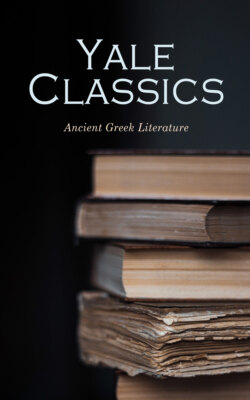Читать книгу Yale Classics - Ancient Greek Literature - Anacreon - Страница 142
На сайте Литреса книга снята с продажи.
The Life and Work of Anacreon
ОглавлениеTable of Contents
No one need defend the character of ANACREON of Teos; though, since he lived in good society to the age of eighty-five, he cannot have been as bad as he wishes us to believe. His poetry is derived from the Lesbians and from the Skolia of his countryman Pythermus. He was driven from Teos by the Persian conquest of 545 B.C.; he settled in Abdêra, a Teian colony in Thrace; saw some fighting, in which, he carefully explains, he disgraced himself quite as much as Alcæus and Archilochus; finally, he attached himself to various royal persons, Polycrates in Samos, Hipparchus in Athens, and Echekrates the Aleuad in Thessaly. The Alexandrians had five books of his elegies, epigrams, iambics, and songs; we possess one satirical fragment, and a good number of wine and love songs, addressed chiefly to his squire Bathyllus. They were very popular and gave rise to many imitations at all periods of literature; we possess a series of such Anacreontea,dating from various times between the third century B.C. and the Renaissance. These poems are innocent of fraud: in one, for instance (No. 1), Anacreon appears to the writer in a dream3 ; in most of them the poet merely assumes the mask of Anacreon and sings his love-songs to 'a younger Bathyllus.' The dialect, the treatment of Erôs as a frivolous fat boy, the personifications, the descriptions of works of art, all are marks of a later age. Yet there can be no doubt of the extraordinary charm of these poems, true and false alike. Anacreon stands out among Greek writers for his limpid ease of rhythm, thought, and expression. A child can understand him, and he ripples into music. But the false poems are even more Anacreontic than Anacreon. Compared with them the real Anacreon has great variety of theme and of metre, and even some of the stateliness and reserved strength of the sixth century. Very likely our whole conception of the man would be higher, were it not for the incessant imitations which have fixed him as a type of the festive and amorous septuagenarian.
3 Cf.20 and 59.
